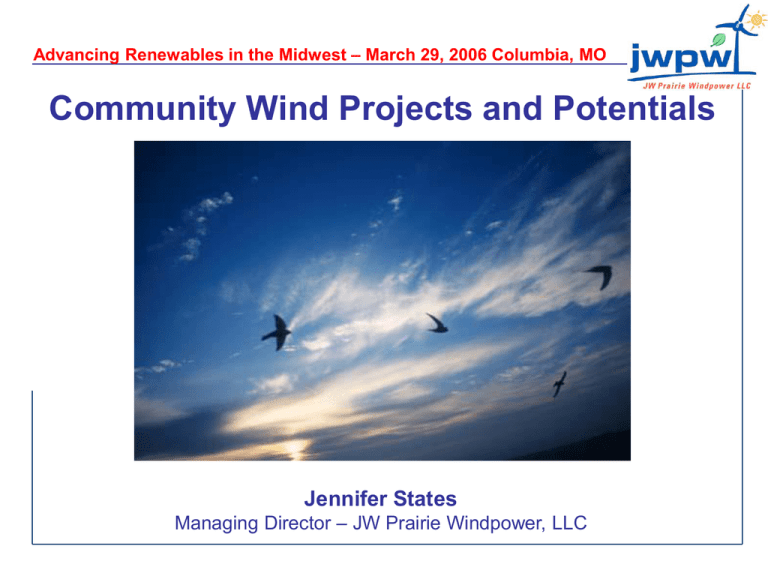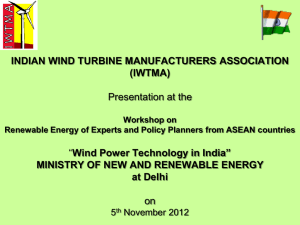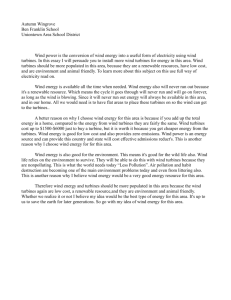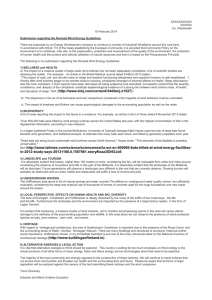Jennifer States: Community Wind Projects and Potentials
advertisement

Advancing Renewables in the Midwest – March 29, 2006 Columbia, MO Community Wind Projects and Potentials Jennifer States Managing Director – JW Prairie Windpower, LLC Contents Models of wind development Who we are Wind power growth worldwide and in the USA Importance of policy Wind power potential in Missouri Community wind: model, advantages, cooperation with communities & policy needs Models of Wind Development Large-scale wind model • 20-200 MW projects • Turbines located in one area • Large grid connection & transmission needs • Economies of scale achieved Community-scale model: • 1-20 MW Projects • Dispersed clusters • Simplified grid connection • Local ownership • More uniform average yield The juwi-Group Workforce: about 120 people (worldwide) Activities: development, construction, financing and operation & maintenance: wind turbines - 35 projects - 270 megawatts photovoltaic systems - > 400 installations - ~ 17.000 kWpeak bioenergy plants Annual Revenue: $100+ million The juwi-Group Worldwide Why Wind? Wind Works! Improved Reliability Improved Productivity - More Efficient - More Economical Wind is Flexible Scale – big or small projects Time – short lead times Ownership – local or outside Wind Power Worldwide Wind Power in the USA Wind Power Worldwide Policy Drives Worldwide Wind Power Growth Installed MW of wind power generation in Europe Europe 2005 Total installed capacity: 40,504 MW Expansion: 6,183 MW Legend: Countries with quota system Countries with reserved price system Wind Power in the USA Installed MW of wind power generation in the USA USA 2005: 9,149 MW USA 2004: 6,725 MW Source: AWEA, January 2006 Importance of State Policies Effect of PTC on the US Market Annual Megawatts Installed Source: AWEA Wind Power Outlook 2005 Wind Power Comparison Europe: 40,504 MW of installed wind power capacity Germany: 2-times the size of MO Germany wind conditions similar to those in MO BUT: more than 17,000 turbines Illinois: Wind conditions comparable to Missouri RPS established: 2% of power mix by 2006 and 8% by 2012 107 MW more wind capacity installed in IL North America headquarters of Suzlon in Chicago, IL Iowa: RPS, state PTC, grants/loans and other incentives in place 836 MW more wind capacity installed Top 20 States Benefiting from Wind Investment Technical Report of the Renewable Energy Policy Project, September 2004 Wind Mapping Technology Wind Power Potential in Missouri AWS TRUEWIND Wind speed map of Missouri at 100 m height Turbines For Low Wind Speed Sites Improved technology guarantees economical feasibility, even for less windy sites 500 times more energy output since 1980 Turbines For Low Wind Speed Sites Historical and Projected Cost of Wind Energy Compared to Market Prices of Electricity from Fossil Fuels. Community Wind Project development model Advantages & benefits juwi connection to community wind Cooperation with communities Policy needs Models of Wind Development in the USA Large-scale wind model • 20-200 MW projects • Turbines located in one area • Large grid connection & transmission needs • Economies of scale achieved Community-scale model: • 1-20 MW Projects • Dispersed clusters • Simplified grid connection • Local ownership • More uniform average yield Community Wind Model Project development – Land easement – Power purchase agreement – Turbine purchase & installation Local landowner or “community” partners with tax-motivated corporate investor to own utilityscale wind turbines & sell power to the utility. Ownership of project LLC “flips” after 10 years. First 10 Years Corporate Investor (John Deere) – Owns 90-100% of project – Gets PTC, MACRS – Gets electricity revenues “Community” – Gets lease payments – Other payments Next 10+Years Corporate Investor (John Deere) – Sells project to “community” at fixed or low price “Community” – Owns project – Gets electricity revenues One example of a financing model: Modified Minnesota Flip Advantages of Community Wind Transmission: More opportunities for interconnection locations Environmental: Community wind projects are less intrusive on landscape and can deliver easier permitting Local Participation: Flexible ownership structure provides greater opportunities for local participation Rural Economic Development: Community wind projects deliver greater economic benefits to the rural economy Regulatory & Technical Benefits of Community Wind FERC Standardized Interconnection Rule for “Small Generators” Small defined as 20 MW or less Reduce overall cost of electricity to customers via development of alternative energy sources and distributed generation Appropriately simplify interconnection procedures for small generators Possible Connection to Distribution System Reduces interconnection cost Provides more locations for interconnection Opportunity to work with utility for advantageous siting of project to meet grid and customer needs Wind Energy Benefits Remain in Rural Communities Economic benefits to local counties • Inward investment • Contributions to counties in lieu of taxes New income for landowners • Contributes to securing future & livelihoods • Creates additional spending in local communities New jobs & training opportunities • New local jobs for young graduates: Training through local colleges • On a per MW basis, wind power contributes more to job creation & economic development in rural areas than any other type of electric power generation Spin-off benefits for the local community Procurement of goods & services Tourism potential and associated start-up industries Comparison of Development Models Comparison of Development Models The juwi Connection to Community Wind juwi experience in small project development (1 – 33 MW) and cooperative ownership models in Europe. Cooperation for development of projects on all levels: cities, municipalities, rural electric co-ops, utilities and farmers. Strong network of contacts and policy expertise. Wind ranging expertise in taking a project from initial concept through construction to O&M. Working Closely With Local Communities Energy Landscape in Morbach : A highlight in juwi’s history Location: Germany, Rhineland Palatinate, around 100 km southwest of Mainz Total investment: 35 million Euro Wind turbines: 14 Vestas V80/2.0 MW → 28 MW (rotor diameter: 80m / hub height: 100m) annual energy production: 45 million kWh Solar power plant: 500 kWpeak (4,000 m²) (Sharp C 160 / Kyocera KC 158) annual energy production: 450,000 kWh Bioenergy plants: (under development) - Wood fired heating plant - Biogas installation Co-operation with Local Utilities 50 % - 50 % Partnership between: juwi GmbH / Pfalzwerke AG (regional utility) •Date of foundation: May 2003 •Installed wind turbines: 5 x E-66; 1 x V80; 9 x GE 1.5sl and 6 x Fuhrlaender MD77 •Prospects: Around ten turbines each year Construction of a 1.5-MW turbine (GE Wind Energy 1.5sl) in Rhineland-Palatinate Co-operation with Local Municipality Partnership between: juwi GmbH (50%) / Municipal Works of Mainz City (50%) Founded in June 2005 4 solar installations are already set up (46 kW peak) Further solar projects planned in and around Mainz Planned wind farm in Summer 2006: 2 wind turbines in Mainz-Hechtsheim (4MW) Community Wind Policy Needs Federal policy provides valuable support that is critical to the viability of most community wind projects The tax-based nature of federal support is not conducive to community wind ownership; innovative ownership structures are required to capture federal and state incentives States have been driving the market by implementing policies that differentially support community wind Community wind requires stable policies that reduce costs & encourage utility purchase Conclusions Wind Energy Works! Policy drives the market Missouri has wind potential The Community Wind model delivers many benefits, especially to the rural communities Careful planning and policy can make Community Wind a reality in Missouri Wind Power Harvest Clean Energy For further information: Jennifer States Managing Director JW Prairie Windpower LLC 3211 Clinton Parkway Court, Suite 2 Lawrence, Kansas 66047 phone. 785.856.5997 fax. 785.856.5894 e-mail. states@uwi-international.com


